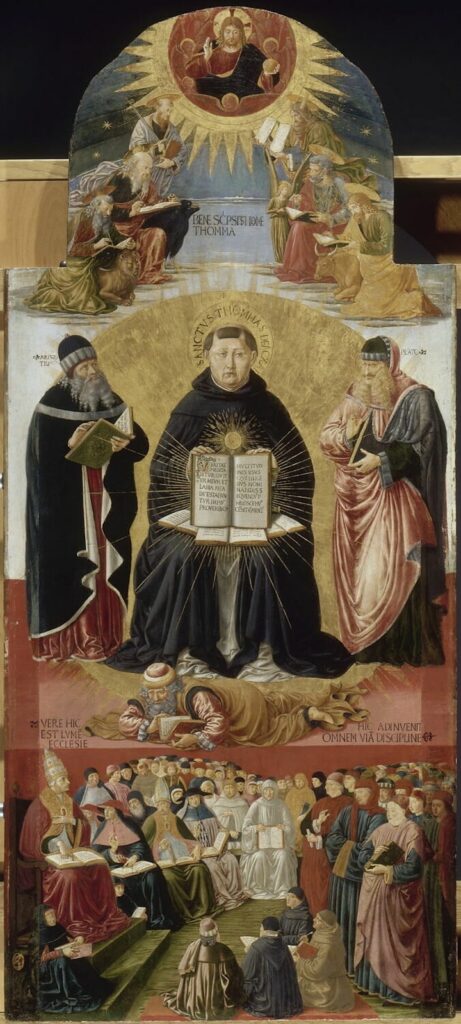Catholicism is a religion of Faith and Reason – and has a rich, centuries-long tradition of deep thought about God and man. But the Catholic “thing” is also a religion of mysteries – not superstitious mumbo-jumbo as some critics believe, but mysteries in the sense that human reason has limits obvious to reason itself. We don’t know – and cannot know – via ordinary human reasoning, where the world and we ourselves come from, or where we are going. For guidance in living with those and other mysteries, reason at its best recognizes that we need Revelation, a revelation from the One who does know. And we have a reasonable Faith, therefore, in what He has delivered.
In an unsettled time like ours – a time when great confusions are rife even within the Church – it’s more urgent than usual to maintain that Faith. Amidst confusions and worse, skeptics point to the many evils in the world as evidence that our belief in a loving Creator is mere wishful thinking. Why, for instance, would such a Being create human beings who – as we see over and over in history and no less in our own “enlightened” age – are quite capable of industrial-scale murder (including the holocaust of tens of millions of innocents in the womb), war, torture, rape, slavery, oppression, and the thousands of other acts that constitute what St. Augustine called the mysterium inquitatis – the mystery of evil.
One traditional answer is that God took the risk of creating free human beings in the knowledge that He would do something even greater in redeeming us, after we’d fallen. If you want to read a brilliant example of how all that signifies something of unsuspected gloriousness, it’s worth spending some time with the first pages of Tolkien’s Silmarillion (free online here), in which God sings the world into existence along with the angels. And then, like a musical prodigy, incorporates the discordant notes introduced by the Devil into a breathtakingly beautiful symphony.
Mystery still surrounds all this, of course, both because a mystery by definition has no complete explanation in this world, and because, frankly, our human reason would have preferred something less exalted. Most of us would have preferred what we regard as “discord” never to have existed. We want an unbothered existence. But all indications are that God thought that a simpler human story would not have been as wonderful as what He actually chose to do. And it’s part of the Faith to understand what that means, as much as we are able.
We get help from several of our Christian ancestors. At the very beginning of Dante’s Paradiso, for example, Beatrice explains:
All things whate’er they be
Have order among themselves, and this is form,
That makes the universe resemble God. . .
Hence they move onward unto ports diverse
O’er the great sea of being. . . (Par. I)
This goes to the heart of what ails us at present. We know many individual things now through various sciences and technologies, even know some moral principles, but we’ve lost the One Thing that holds the Many together: the order that God put into the world. Dante and the whole Catholic tradition contain a good deal of Thomist and Aristotelean reasoning, but the overall message is more Augustinian: we need the divine ordo amoris. “O Thou who art love, set my loves in order.”

This prayer is more urgent than ever today, even within the Church. Only the Catholic Church has the full range of cultural resources – thanks to its Jewish roots, Greek philosophy, Roman law, medieval theology, etc. – to bring a universal perspective to the world. Catholic simply means, “according to the whole,” (Gk. kata holos), i.e., universal.
We don’t simply have a list of doctrines, or even moral principles, or a Creed. We have – uniquely have – a vision of the whole that can fit the many things that God created into an intelligible order: A divine order that we’ve been given and need to keep always in mind to guide us through the many confusions that mark this age in the life of the Church.
And that’s what we try to convey here at The Catholic Thing. By this point, if you read the introductory Note above, you may be thinking that this is the oddest start in all human history to a fundraising drive. And you may be right.
Any daily publication worthy of attention must, of course, deal with specific questions, problems, conflicts, etc. And to be sure, we do, not only in our daily columns but in our coverage of events in Rome, our TCT courses, and our new series of podcasts. Like many people, we want to save the Church, America, the West, civilization. But not only; we do it all against the background of an even larger vision.
Because if all we do is deal with “issues,” we would do so only in much the same way as “the world” does. If there’s any “paradigm shift” needed now in the Church – and in the world – it’s a regular reminder that all questions participate in a larger order, one harder than ever to see just now, perhaps. But a divine order nonetheless that the Church is uniquely qualified to keep before us, and to advance – and that we’ve been neglecting at our peril.
Ultimately, we appear daily here at TCT and come to you just two times a year for support, because what’s at stake is more than the controversies. At the Synod on Synodality, for instance, there was much talk of listening and dialogue, accompaniment and welcoming. And in the right context, that would be fine.
But the right context, as St. Paul put it, lies on an entirely different plane:
Put on the armor of God so that you may be able to stand firm against the tactics of the devil. For our struggle is not with flesh and blood but with the principalities, with the powers, with the world rulers of this present darkness, with the evil spirits in the heavens. (Eph. 6:11-12)
To the world, it’s ridiculous superstition to believe that we’re in a spiritual battle for the salvation of souls – an “old” perspective, bordering on “backwardism,” that seems largely outside the purview of synodality. But that’s what the Faith is really about. And why we are here, every day, at The Catholic Thing.
__________

















